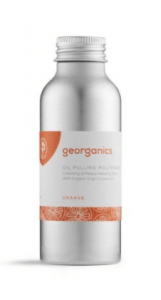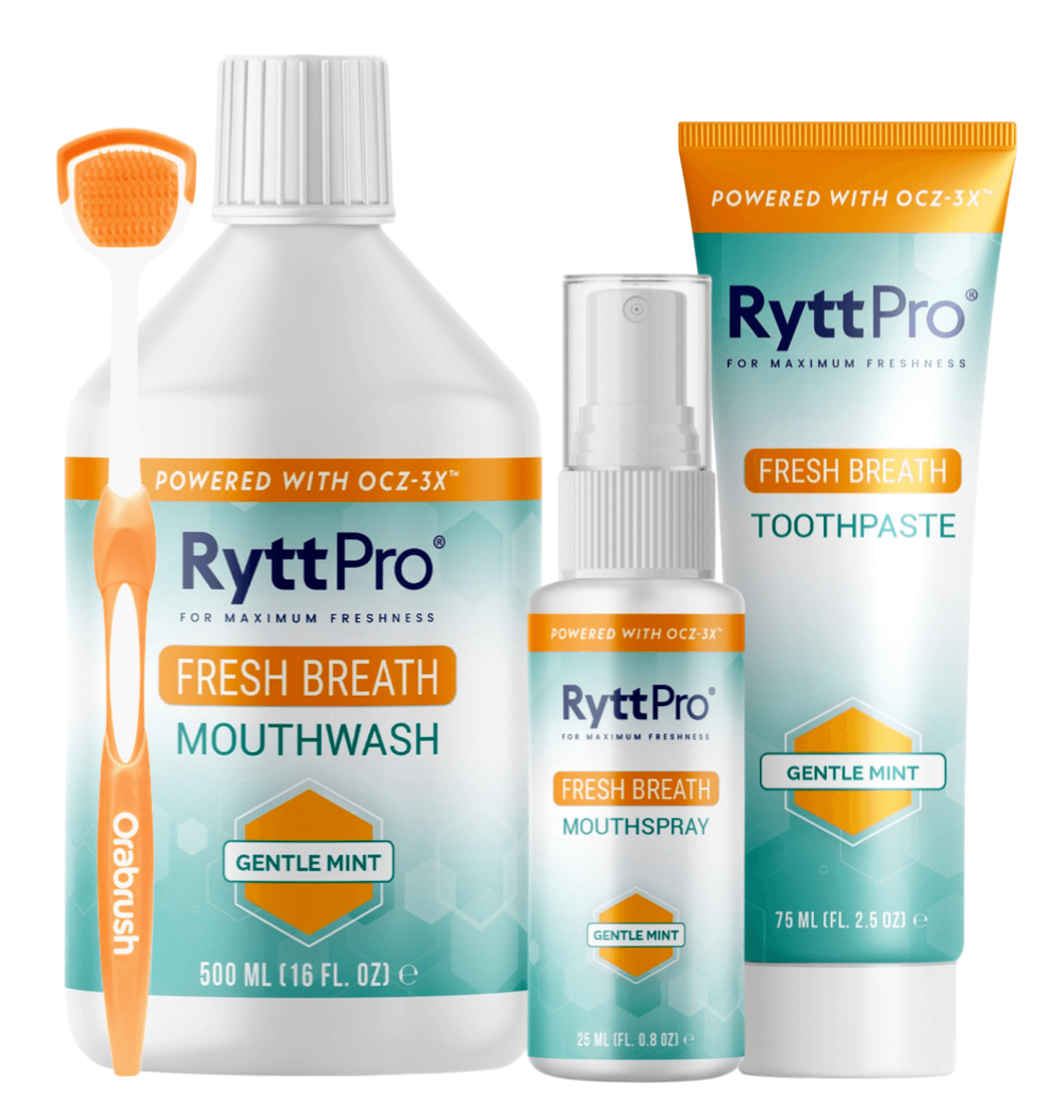Auteur: Elisabeth Telsa – laatst bijgewerkt 24 mei 2024
Wat zijn de 10 allerbeste mondwaters? Het is verstandig om te weten waarmee je je mond spoelt. Veel mondwaters bevatten namelijk ingrediënten die juist een nadelig effect hebben op je mondgezondheid. Een mix van agressieve chemicaliën kan het evenwicht van je mondflora behoorlijk verstoren. Mogelijke gevolgen zijn verkleuringen op je tanden, tongaanslag, aften, een droge mond en geïrriteerde mondslijmvliezen. Een verstoorde mondflora tast je mondgezondheid aan en dat is niet bevorderlijk voor het behoud van je gebit.
Er worden stoffen gebruikt die je beter kunt vermijden. De belangrijkste licht ik hieronder toe.
Sodium Lauryl Sulfaat
Kijk goed naar de hand op het plaatje hieronder. Deze persoon heeft zijn handen gewassen met zeep die SLS (sodium lauryl sulfaat, ook bekend als sodium laureth sulfaat) bevat. Je ziet wat het doet, het beschadigt de huid. SLS is een industrieel reinigingsmiddel dat extreem ontvettend werkt. Het wordt toegevoegd aan alle reguliere verzorgingsmiddelen zoals zeep, shampoo, tandpasta en mondwater.
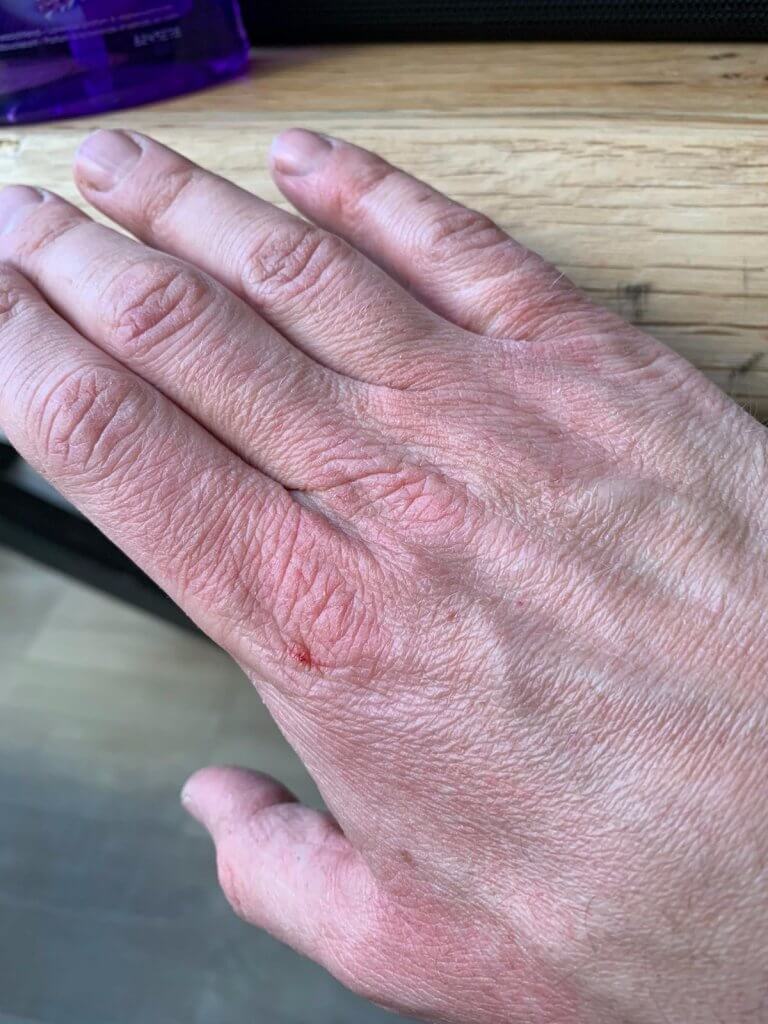
De reden daarvoor is dat SLS een heel goedkoop ingrediënt is met een groot effect: het schuimt zo lekker. Dat geeft je het gevoel dat het goed werkt. De keerzijde is dat het het bovenste laagje van je slijmvliezen beschadigt net als huid van de hand. Voor de juiste werking van je mondslijmvliezen, en daarmee je mondgezondheid, is dit bovenste beschermende laagje van groot belang.
Alcohol
Ook alcohol heeft een nadelig effect op de mondslijmvliezen, het droogt ze uit. Alcohol vermindert de speekselproductie, terwijl speeksel nu juist de natuurlijke bescherming vormt tegen schadelijke mondbacteriën. Bovendien verstoort alcohol het evenwicht van de mondflora. Een vervelende combinatie, die ervoor zorgt dat schadelijke bacteriën kunnen gedijen.
Overigens wordt alcohol niet toegevoegd vanwege de antibacteriële werking. Het is een hulpstof die ervoor zorgt dat de werkzame bestanddelen zich vermengen. Oliën als eucalyptol, thymolen en methylsalicylaat helpen bacteriën bestrijden, maar lossen zonder alcohol niet op in water.
Antiseptische middelen
Antiseptische middelen zijn wel werkzame, sterke bacteriedodende ingrediënten. Chloorhexidine, waterstofperoxide en triclosan worden gebruikt in medicinale mondwaters tegen ernstige wondinfecties en tandvleesontstekingen. Maar voor een dagelijkse mondspoeling zijn ze ongeschikt omdat ze ook de nuttige bacteriën doden. Daarmee verstoren ze het evenwicht van de mondflora en werken uiteindelijk averechts. Chloorhexidine kan bovendien bruine vlekken op je tanden veroorzaken.
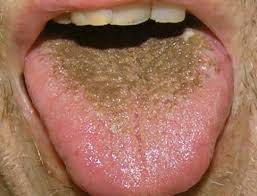
Overbodige kleurstoffen
Kleurstoffen in mondwater dienen geen ander doel dan het product visueel aantrekkelijk maken. Nergens voor nodig, maar ze verhogen wel de kans op allergische reacties.
Het beste mondwater
Mondwater gebruik je om je mond nog schoner en gezonder te maken. Met de tandenborstel en flosdraad kom je nu eenmaal niet overal. De bovenstaande ingrediënten helpen daar niet aan mee, sterker nog: ze tasten je mondgezondheid op verschillende manieren aan.
Wat dan wel?
Er bestaan genoeg effectieve mondwaters zonder de bovengenoemde schadelijke ingrediënten. Bovendien stabiliseren en verlagen ze de zuurgraad in de mond. Om je te helpen kiezen vind je hieronder een Top 10 van de beste mondspoelingen.
1. JuliBrite Mondwater
Met stip op 1 staat JuliBrite Mondwater met een unieke actieve zuurstofformule, gegenereerd door honing. Het toevoegen van zuurstofmoleculen is een effectieve maar mondvriendelijke manier om de schadelijke bacteriën te bestrijden. Die zijn namelijk anaeroob, wat wil zeggen dat ze gedijen in een zuurstofarme omgeving. Het mooie van actieve zuurstof is dat het niet alleen de schadelijke bacteriën zelf bestrijdt, maar ook de stinkende zwavelgassen neutraliseert die verantwoordelijk zijn voor een slechte adem.
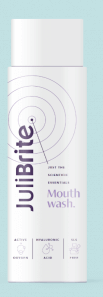
Ook zink werkt alleen tegen de schadelijke bacteriën, maar laat het nuttige deel van de mondflora ongemoeid. Het lichaamseigen enzym hyaluronan heeft een natuurlijke bacterie-bestrijdende en anti-oxiderende werking. Het verzorgt het tandvlees en helpt irritaties en ontstekingen voorkomen.
De natuurlijke zoetstof xylitol heeft tal van gunstige effecten op het gebit en de mondholte. Het verlaagt de zuurgraad in de mond en maakt het tandglazuur gladder. Dankzij deze ingrediënten is JuliBrite Mondwater de perfecte mondspoeling om je gebit te reinigen, je tandvlees gezond te houden en je adem te verfrissen.
2. RyttPro Mondwater Magic Mint
De formule van RyttPro Mondwater Magic Mint is gebaseerd op een krachtige, maar mondvriendelijke combinatie van de actieve zuurstofformule OZ-3X, zink en CPC.
Actieve zuurstof is de beste manier om niet alleen de schadelijke bacteriën aan te pakken, maar ook hun stinkende gassen op moleculair niveau af te breken. CPC is een veilige bacteriedodende stof, die het celmembraan van een anaerobe bacterie binnendringt, waardoor deze gaat lekken en afsterft. De nuttige microben worden ongemoeid gelaten, zodat het evenwicht van de mondflora in tact blijft. Ook zink is een veilig maar effectief middel tegen schadelijke bacteriën.
Samen beschermen ze je gebit tegen cariës (gaatjes) en verzorgen je tandvlees verzorgt. De milde mint-smaak geeft je direct een frisse adem en een schoon mondgevoel.

3. OraMarie Mondwater
Ga je voor puur natuur? Dan is OraMarie Mondwater voor jou het beste mondwater. Het bevat geen actieve zuurstofformule, maar effectieve natuurlijke ingrediënten van biologische teelt. Toch reinigt het je gebit zoals een goed mondwater hoort te doen. De formule is gebaseerd op de natuurlijke antibacteriële werking van kokosolie en geactiveerde houtskool. Als bonus maken deze bestanddelen je tanden ook witter op een natuurlijke wijze. De geactiveerde houtskool is zo fijn gemalen dat je tandglazuur er niet van slijt. Omdat het pigmentloos is blijft je wastafel schoon.
OraMarie Mondwater verzorgt en hydrateert ook je mondslijmvliezen en tandvlees als de beste. Hiertoe zijn aloë vera en ontzuurde vitamine C toegevoegd. Het reinigt je gebit en verzorgt de zachte weefsels in je mond met de kracht van natuurlijke ingrediënten.
4. Oxyfresh Mondwater Lemon mint
Oxyfresh Mondwater Lemon mint is wel weer een combinatie van een actieve zuurstof formule en zink. Het bestrijdt de schadelijke bacteriën en hun vervelende zwavelgassen, maar zonder de goede onderdelen van je mondflora om zeep te helpen.
Xylitol is toegevoegd vanwege de gunstige eigenschappen voor je mondgezondheid. Het verlaagt de zuurgraad in de mond, zodat mineralen uit het voedsel beter worden opgenomen in je tanden. Xylitol remt tandplak af door je tandglazuur gladder te maken.

Het frisse, bruisende Oxyfresh Mondwater Lemon mint vergeet ook de zachte weefsels in je mond niet. Om die te hydrateren en te verzorgen is aloë vera toegevoegd. De frisse citroen-mint smaak geeft je direct een fris gevoel en stimuleert de speekselklieren, wat bijdraagt aan een gezonde mond.
5. OraRelieve Mondwater
OraRelieve is een productlijn die speciaal is ontwikkeld voor mensen met xerostomie, oftewel droge mondklachten. In dit mondwater nemen lichaamseigen en melk-enzymen de functies van het eigen schaarse speeksel over. Zo worden schadelijke bacteriën op een mondvriendelijke en milde manier bestreden, want een droge mond moet je natuurlijk niet nog verder irriteren.
De enzymen pakken niet alleen de bacteriën aan, ze verzachten en hydrateren ook de slijmvliezen. Xylitol remt de vorming van tandplak af, maakt de tanden gladder en stimuleert de speekselklieren met de frisse smaak.
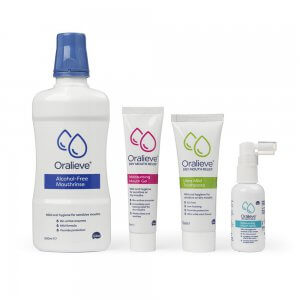
Als je last hebt van een droge mond is het verstandig om niet alleen mondwater, maar ook andere producten tegen droge mondklachten te gebruiken. Het OraRelieve Droge Mond Pakket bevat behalve het mondwater tandpasta, een mondspray en een mondgel met dezelfde mondvriendelijke formule. Zo kun je de gehele dag door je mond extra hydrateren.
6. Oravall Mondwater
Oravall Mondwater is weer gebaseerd op een actieve zuurstofformule, de mondvriendelijke manier om korte metten te maken met schadelijke bacteriën en hun stinkende zwavelverbindingen. Bij een slechte adem wordt de geur niet gemaskeerd, maar bij de kern aangepakt.
Vergeleken met andere mondwater op basis van actieve zuurstof heeft Oravall Mondwater een hogere concentratie aan zuurstof. Dit maakt deze mondspoeling bij uitstek geschikt als je ernstig last hebt van een slechte adem. Natrium bicarbonaat, oftewel zuiveringszout, ondersteunt deze werking en reguleert bovendien de zuurgraad in de mondholte.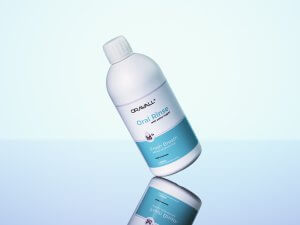
Oravall mondwater reinigt je gebit, ondersteunt de mondflora en zorgt voor een frisse adem.
7. TonsilFresh Mondwater
Ook TonsilFresh Mondwater werkt door middel van een actieve zuurstofformule, en ook weer één met een hoge dosis zuurstof. Het doet wat mondwater moet doen, namelijk je gebit reinigen en je mondholte verzorgen. Het wordt bij uitstek aanbevolen als mond- en keelspoeling voor mensen die chronisch last hebben van amandelstenen.

Het bestrijdt een slechte adem (halitose) effectief zonder de mondflora te verstoren en de milde mint-smaak zorgt voor een prettige smaak.
8. JuliBrite Whitening Mondwater
De formule van JuliBrite Whitening Mondwater bevat geen actieve zuurstofformule, maar doet daar zeker niet voor onder. Met behulp van natuurlijke ingrediënten zoals biologische kokosolie en geactiveerde houtskool wordt tandplak effectief maar veilig van je gebit verwijderd. Daarnaast blijven je tanden ook nog eens witter. De pigmentloze geactiveerde houtskool is heel fijn gemalen, zodat het je tandglazuur niet beschadigt.
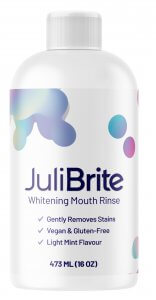
Aloë vera en ontzuurde vitamine C zijn toegevoegd om de zachte weefsels in je mond te verzorgen en te beschermen. Een uitstekend natuurlijk alternatief voor een schone en frisse mond.
9. RyttPro Mild Mint Mondwater
Dit is het zusje van nummer 2, RyttPro Mondwater Magic Mint. RyttPro Mild Mint Mondwater is gebaseerd op dezelfde krachtige combinatie van de actieve zuurstofformule OZ-3X, zink en CPC. Het bevat daarnaast xylitol en tal van verzorgende ingrediënten.
De milde mint-smaak maakt dit mondwater geschikt voor mensen die niet houden van sterke mint-smaken of daar gevoelig voor zijn. De formule is echter niet minder effectief om de schadelijke bacteriën en hun stinkende gassen effectief aan te pakken. Het beschermt je gebit optimaal tegen cariës (gaatjes), houdt je tandvlees gezond en je adem fris.
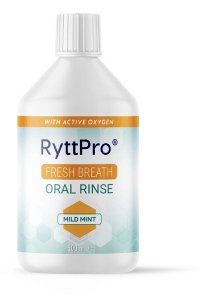
10. UK Organics Mondolie
Op de 10e plaats geen mondwater, maar een mondolie. UK Organics Mondolie doet niet onder voor de bovengenoemde mondwaters, maar werkt net even anders. De basis is biologische kokosolie, die de mondslijmvliezen verzacht en hydrateert.
Deze mondolie is geïnspireerd op de eeuwenoude Ayurvedische praktijk van “oil pulling”. Hiervoor kun je ´s ochtends voor het tanden poetsen 5 tot 20 minuten de olie in je mond rond laten bewegen. Dan pers je de schadelijke bacteriën uit alle hoekjes en gaatjes van je gebit en “vang” je ze in de olie, die je vervolgens uitspuugt. Naar verluidt heeft oil pulling niet alleen een reinigend effect op je gebit, maar op je totale systeem omdat ook gifstoffen via je mondslijmvliezen in de olie terecht komen.
Er zijn drie varianten van UK Organics Mondolie: Charcoal voor wittere tanden, Orange tegen droge mondklachten en Tea tree voor gezond tandvlees. De ingrediënten van UK Organics Mondolie zijn hoogwaardig biologisch, vegan en de verpakking is plastic-vrij en volledig te recyclen.
